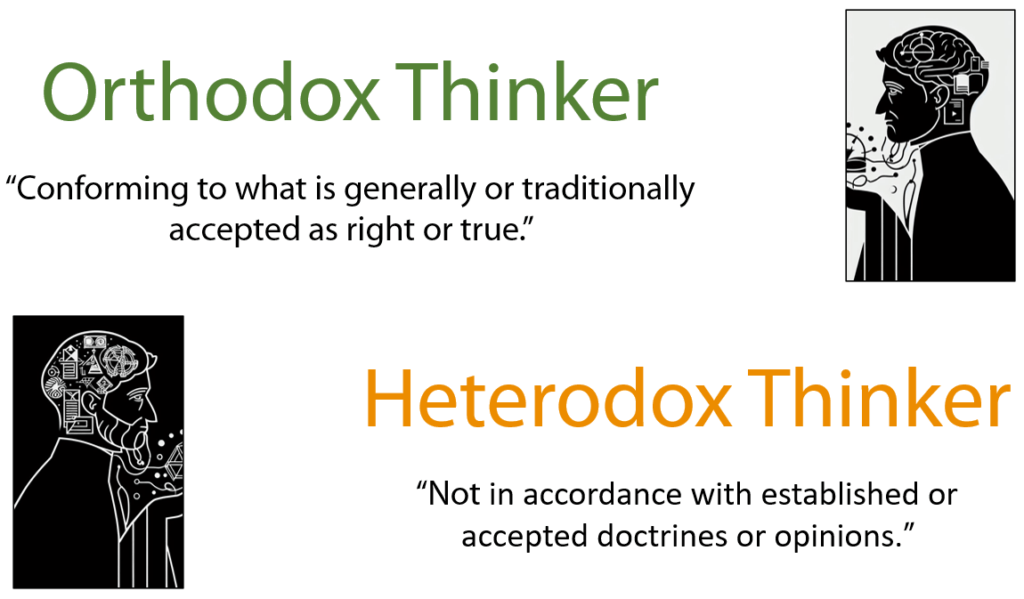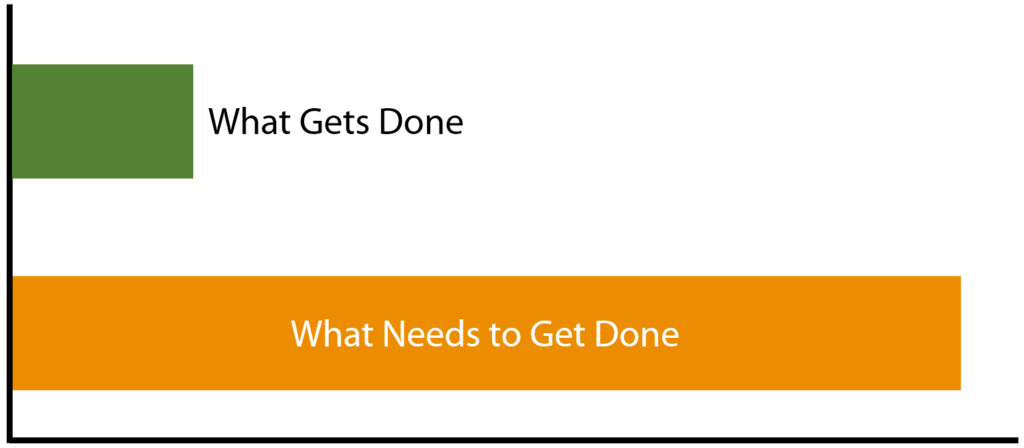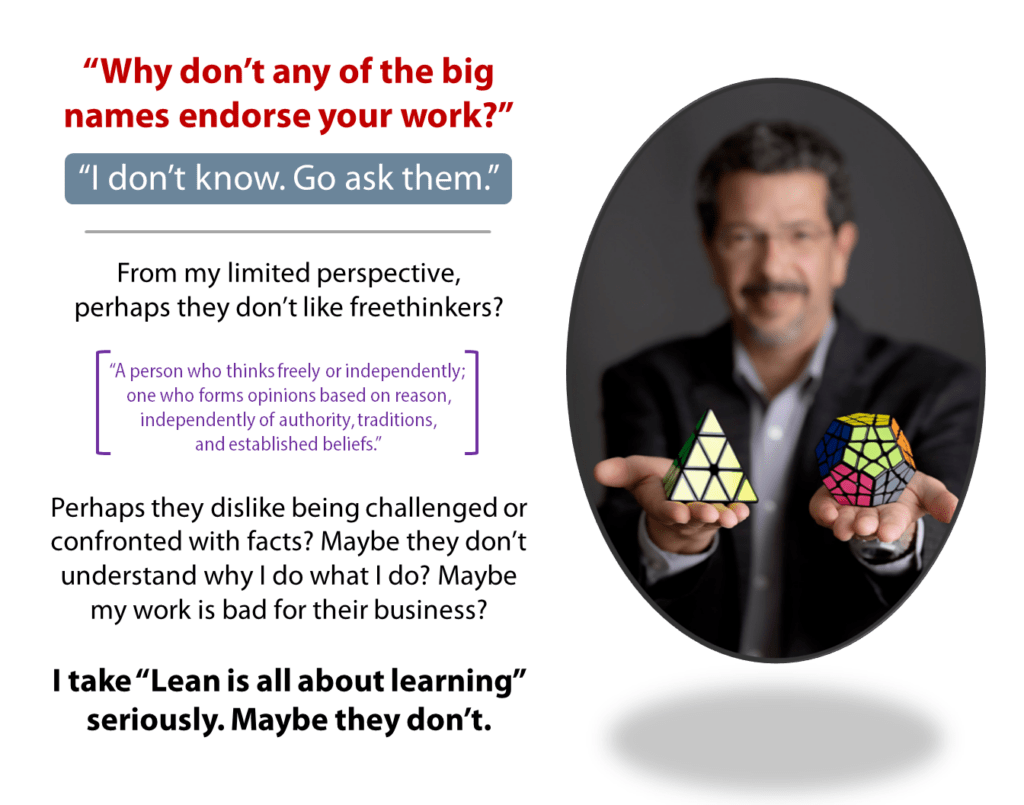Sometimes it frustrates me that people misunderstand my intentions and the work that I do to advance progressive leadership and management.
First, there are the noisy people who are so wildly off base in their personal criticism of me and of my work that their main aim is clear: To discredit and discount my work, reduce the influence of my work, and devalue diversity of thought. What these otherwise good folks have to say — typically informed by poor argumentation, the heavy use of non sequiturs, and repeated use of faulty logic (always invoking the “appeal to accomplishment” and “appeal to authority” fallacies) — can be dismissed. In their view, anyone who has not met or exceeded their experiences is by their definition inadequate. They consistently fail to produce tangible evidence in support of their arguments against someone or something because that takes a lot of work, which they refuse to do. They also mistakenly confuse my technical criticism of someone’s work with ad hominem attacks on the person who did the work. It is a worthy, learning-filled lesson to remember on how intelligent people can simultaneously be remarkably unintelligent — or perhaps, instead, strikingly belligerent to suit their own interests.
Next, are those who have a much simpler type of difficulty with my work because it is not orthodox; it is both orthodox (see example) and heterodox (see example). Heterodox thinking is, of course, much more interesting because it is more creative and insightful, and generally more helpful than orthodox thinking. But it goes against the status quo and that leaves many people perplexed.

My orthodox-heterodox writings can also generate confusion by what appears to be contradictions:
- “Does he support Lean management, or is he against it?”
- “Is he bashing and judgmental of CEOs, or is he pointing out problems with systems and preconceptions?”
- “Is it his opinions, or is it facts supported by evidence?”
- “Does he write about dichotomies, or does he write about interconnected systems?”
- “Is he a professor focused on theory, or is he a practitioner.”
I understand the confusion, given that my work follows different but related paths in my effort to do one simple thing: Understand what’s going on with respect to leadership and management, both past and present — classical management and progressive management. The answers to the above five bullet points are:
- I am for Lean management, but against its popular understanding and delimited practice as described in my extensive writings.
- Perhaps blaming CEOs in the past (i.e., as captain of the ship, responsible not just personally but for the system failure that occurred under their command that affects lives, livelihoods, and property). My writings in recent years clearly focus squarely on the system: the Institution of Leadership and the System of Profound Privilege.
- It is facts supported by evidence. Comments social media can appear as opinion, but I often reference my books and papers which contain the facts that I present.
- I write about interconnected systems — the behavior complex systems, not individual leaders or managers. However, not all dichotomies are simplifications, inaccurate, or misleading (e.g. black-white, day-night, war-peace, happy-sad, binary code, etc). What my historically contextualized writings expose are complexities and nuances, and engaging people in the historically tough subject of overcoming obstacles to advancing progressive management.
- I am both professor (fully credentialed and now emeritus) grounded in reality, and long-time improvement practitioner.
Problem-solving is not universally respected. Generally, there is respect for people who seek to solve certain kinds of problems, and less respect, or even disrespect, for those who seek to solve other kinds of problems. Mostly, this breaks down between what is or is not socially acceptable within a given community of interest such as Lean management. Some see it as socially unacceptable to analyze and criticize the work of business leaders or the work of those who have made seminal contributions to Lean, as if both are infallible gods. This perspective reflects ancient tradition and ancient thinking that remains alive today — even in progressively-minded Lean world.
The problems that I have been interested in solving are very different from the types of problems that others in the Lean community are interested in solving. I think people wonder why I spend my time working on such problems. It is because I want to understand various interconnected, long-in-existence problems (really, mysteries) about leadership and management. Most of my colleagues in the Lean community are interested in solving lesser problems. That is not a criticism, but it is instead only to point out the substantial difference in focus between me and my peers.
What I would like people to understand is that I see a huge gap between what needs to be done (typically the domain of heterodox thinkers) compared to what actually gets done (typically the domain of orthodox thinkers), for the betterment of humanity in any social organizational setting. The gap looks to me like a fractal that spans continuous improvement efforts with a team, department, functional silo, company, society, and countries. My recent work helps people understand why the gap exists, and this knowledge can in turn be used to figure out how to close it — but only if they are interested in gaining such knowledge, now or in the future.

Since the start, it has been disappointing to see that none of the top Lean promoters and influencers have been willing to say in public what they say in private regarding Lean management. It is essentially that Lean has largely failed to fulfill its promise, the go-to-market strategy was bungled, and there is a remarkable lack of correction applied to past and current mistakes. As a freethinker, I stepped in to fill the void of saying what needs to be said about 10 years ago, at considerable expense to my friends, my influence, my reputation, and my small business. Yet the few who have been attentive reap the rewards, and, as a teacher, I find that gratifying.

Lastly, it is unfortunate that some people cannot see the good intentions and good heart that I pour into my work, for the purpose of helping people struggle less, both mentally and physically, to live a better life at work and a home. Mine is a lifetime of devotion to learning (and unlearning!), experimentation, and improvement, and sharing it with others, often at the expense of my own interests.
